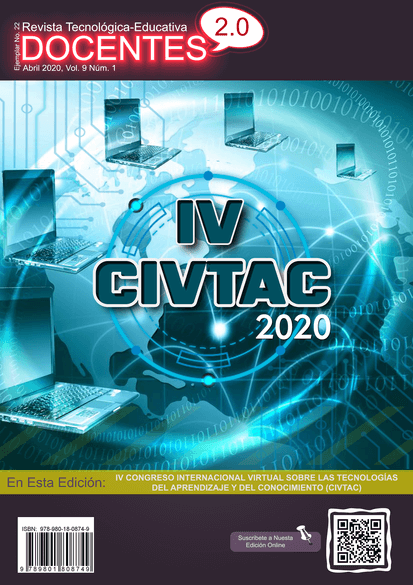Management in knowledge management affects the intellectual capital of higher education institutions in Ecuador
 DOI:
https://doi.org/10.37843/rted.v9i1.95
DOI:
https://doi.org/10.37843/rted.v9i1.95
Main Article Content
Abstract
Management is undoubtedly one of the tasks that universities must attend with priority one of the knowledge management variables. In this context, the present study relates to the knowledge management variables in the administrative process in its management stage and the variable intellectual capital. The objective of this study was to determine how the direction of knowledge management affects intellectual capital in higher education institutions in zone 4 of Ecuador. The research is of a basic - longitudinal type, jointly using documentary, historical, cross-sectional and correlational exploration. The methodology used was the collection of information obtained through data matrices applied to the units of analysis investigated. The dimensions that most influence the knowledge management variable are direction and control, as for the variable intellectual capital, the dimension that most intervenes is human capital.
Downloads
Metrics
Article Details

This work is licensed under a Creative Commons Attribution-NonCommercial-NoDerivatives 4.0 International License.
Those authors who have publications in our journal accept the following terms:
- When a work is accepted for publication, the author retains rights of reproduction, distribution of his/her article for exploitation in all countries of the world in the format provided by our magazine and any other magnetic medium, optical, and digital.
- Authors will retain their copyright and guarantee the journal the right first to publish their work, which will be simultaneously subject to the Creative Commons Acknowledgment License (Attribution-NonCommercial-NoDerivatives 4.0 International (CC BY-NC-ND 4.0)). That allows third parties to copy and redistribute the material in any medium or format, under the following conditions: Acknowledgment - You must properly acknowledge authorship, provide a link to the license, and indicate if any changes have been made. You may do so in any reasonable way, but not in a way that suggests you have the licensor's endorsement or receive it for your use. NonCommercial - You may not use the material for a commercial purpose. NoDerivatives - If you remix, transform, or build from the material, you cannot broadcast the modified material. There are no additional restrictions - You cannot apply legal terms or technological measures that legally restrict you from doing what the license allows.
- Authors may adopt other non-exclusive license agreements to distribute the published version of the work (e.g., deposit it in an institutional archive or publish it in a monographic volume) provided that the initial publication in this journal is indicated.
- Authors are allowed and recommended to disseminate their work through the Internet (e.g., in institutional telematic archives, repositories, libraries, or their website), producing exciting exchanges and increasing the published work's citations.
- Request of withdrawal an article has to be done in writing by the author to the Editor, becoming effective after a written response from the Editor. For this purpose, the author or authors will send correspondence via e-mail: [email protected].
- The author will not receive financial compensation for the publication of his work.
- All Docentes 2.0 Journal publications are under the Open Journal System (OJS) platform at: https://ojs.docentes20.com/.
References
Balmori R., & Schmelkes C (2012). Gestión Del Conocimiento En Educación Superior, Instituto Tecnológico y de Estudios Superiores de Occidente, Departamento de Educación y Valores.
Buchele, R. (1997). Fundamentos de la Administración. Trillas p.147.
Brooking, (1997) A., El Capital Intelectual. Paidós. http://www.gestiondelconocimiento.com /bibliografia_conceptos.htm
Canals, A, 2003. La Gestión del Conocimiento. http://www.uoc.edu/dt/20251/index.html.
Canales Aybar, E. (2014). La Gestión del Capital Intelectual y el Aprendizaje Corporativo del estudiante en la Universidad Nacional Mayor de San Marcos.
Drucker, P. (1995). Managing in a time of great chance. Mass: But-terworth-heinemann.
Edvinsson, L. Y Malone, M. (1998). El Capital Intelectual: Cómo identificar y calcular el valor inexplorado de los recursos intangibles de su empresa. (2nd ed., pp. 30-48). Norma.
Euroforum (1998). Proyecto Intelect. Medición del capital intelectual.: Euroforum, p 200.
Hellriegel, J. (2002). Administración un enfoque basado en competencia. Thomson. P. 411.
Huang, L. - Wang, (1999) Calidad de la Información y gestión del conocimiento. AENOR. N.A. 71.970.
Martínez, F., Peñalver, A., Salamanca, J. 2007. Gestión estratégica del conocimiento. Universidad de Cantabria.
Moya-Angeler, J. (2001): “Origen y situación actual de la gestión del conocimiento”. Economistas, no. 87, p. 397 -401.
Polanyi, M. (1967), "The Tacit Dimension", Ed. Doubleday.
Sallis, E y Jones, G. (2002). Knowledge Management in Education: enchancing learning and education. Kogan Page.
Savage, Ch. (1991). “Presentación at decworld, The International Trade Show for Digital Equipment Corporation”, Massachusetts.
Tiwana, A. (2002). The Knowledge management toolkit: orchestrating IT, strategy, and knowledge platforms. Upper Sadder River, Prentice Hall.






